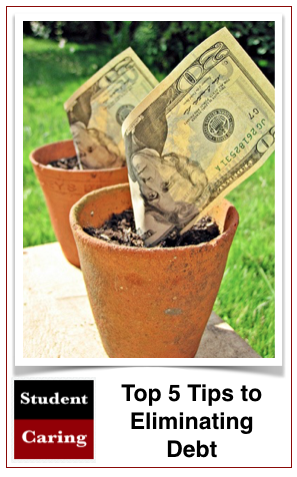I want to preface this article saying that each person’s debt is different, as is the ways in which we handle debt. There are many that suggest doing one thing, but there’s another way that works better for people. It’s a matter of finding out what works best for you, your spending habits, and the ways in which you pay back your debt. For me, coming out of college with $30,000 in loans was hard to swallow, but using the tips below, I am paying my student loans off one month at a time.
Stop Borrowing Money
Although it may seem hard, one of the best ways to help you eliminate debt is to stop borrowing all together. Take out no further loans until your current ones are paid off, and either don’t have any credit cards or limit yourself to one. If you do need a credit card, use it wisely and always pay it off on time. Everyone has their own strengths and weaknesses when it comes to spending, so play to your strengths.
Make A Budget
Making a budget and a plan is extremely important in helping you become debt free. It’s better to sit down and either do the math yourself or use a program to help you. Making a budget will show you exactly how much you need to pay each month in loans, rent, utilities, food, and more. When you know exactly how much you have to spend to pay off expenses each month, it makes it easier to determine if you should save it or put it towards a loan.
Eliminate What You Don’t Need
Considered a pretty difficult thing to do, sometimes what we need to do is just eliminate what we don’t actually ‘need’ and be willing to make compromises. Do you really need cable TV, lunches and dinner out with friends, and more? It’s good to get creative and eliminate what you don’t need and instead watch your shows online, make dinner for your friends, and eat out less. You will be amazed at how much of a different those few dollars make over the months.
Pay off Smallest Debts First
This can be a controversial tip because everyone looks at debt and how to pay off loans differently but for me, paying off the smaller loans was more rewarding mentally, and therefore what I usually suggest to people. When you look at your student debt and see a $6,000 one that seems impossible to pay off, but then you are able to eliminate a $2,000 much faster, it’s just nice to see it go away. This can also be referred to as a ‘snowball’ effect. Paying the minimum on everything and attacking the smallest balance you have with extra money you assemble and then moving onto another loan.
Be Patient
For most, including me, this is one of the hardest things to do. When I’m paying off my debts, I want to see instant changes to know that I’m making a difference or actually putting a dent into loans. But, debt reduction, especially student loan reduction, is a long and slow process. Although it may not seem at first that you are making a difference or you don’t see significant progress, you are and it will start showing eventually. It helped me to track everything that I was putting into my student loans and actually put a number at the end of the year of how much I paid off.
Brandi Paquet is a recent graduate who is starting her writing career and paying off her student loans. In her spare time she hangs out with her cat, reads CNN Money, bakes, and keeps up on the latest financial news. The article uses some tips and helpful hints to financially navigating college from the Finance U Syllabus from CompareCards.

###
Top 5 Tips to Eliminating Debt

0 Comments